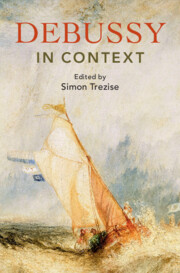Book contents
- Debussy in Context
- Composers in Context
- Debussy in Context
- Copyright page
- Dedication
- Contents
- Illustrations
- Contributors
- Preface
- Notes on the Text
- Abbreviations
- Part I Paris: City, Politics, and Society
- Chapter 1 Paris, the City
- Chapter 2 Paris and the Nation’s Politics
- Chapter 3 Beyond Paris
- Chapter 4 Feminine Beginnings: Women’s Critical Perspectives on Debussy (1897–1914)
- Chapter 5 Consumption and Leisure
- Part II The Arts
- Part III People and Milieu
- Part IV Musical Life: Infrastructure and Earning a Living
- Part V The Music of Debussy’s Time
- Part VI Performers, Reception, and Posterity
- Recommendations for Further Reading and Research
- Index
Chapter 3 - Beyond Paris
from Part I - Paris: City, Politics, and Society
Published online by Cambridge University Press: 23 May 2024
- Debussy in Context
- Composers in Context
- Debussy in Context
- Copyright page
- Dedication
- Contents
- Illustrations
- Contributors
- Preface
- Notes on the Text
- Abbreviations
- Part I Paris: City, Politics, and Society
- Chapter 1 Paris, the City
- Chapter 2 Paris and the Nation’s Politics
- Chapter 3 Beyond Paris
- Chapter 4 Feminine Beginnings: Women’s Critical Perspectives on Debussy (1897–1914)
- Chapter 5 Consumption and Leisure
- Part II The Arts
- Part III People and Milieu
- Part IV Musical Life: Infrastructure and Earning a Living
- Part V The Music of Debussy’s Time
- Part VI Performers, Reception, and Posterity
- Recommendations for Further Reading and Research
- Index
Summary
Following the Franco-Prussian War, Paris regained its former position as an important international cultural centre. This chapter addresses Debussy’s cultural position in relation to the historical framework of the Franco-Russian Cultural Alliance. Within this context, many Russians had already come to Paris around the time of the Exposition Universelle of 1889, including Glazunov, Scriabin, Fokine, Diaghilev and the Ballets Russes, Stravinsky, and others. The first French concerts of Mussorgsky’s music occurred at the 1878 Exposition Universelle. By 1890, the influence of the Russian ‘Mighty Five’ can be traced in the pentatonic/diatonic modalities of Russian folk music in Debussy’s compositions. The Russian impact is apparent in Debussy’s piano music and it. The chapter offers a relational study of how Debussy’s life and works were connected to the broader web of Parisian and French interactions with the world, with a specific focus on Franco-Russian and Franco-Spanish exchanges.
- Type
- Chapter
- Information
- Debussy in Context , pp. 25 - 33Publisher: Cambridge University PressPrint publication year: 2024

